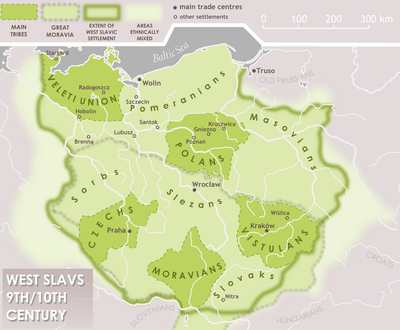Pomeranians (Slavic tribe)
The Pomeranians (German: Pomoranen; Kashubian: Pòmòrzónie; Polish: Pomorzanie) were a group of West Slavic tribes who lived along the shore of the Baltic Sea between the mouths of the Oder and Vistula Rivers (the latter Farther Pomerania and Pomerelia). They spoke the Pomeranian language belonging to the Lechitic branch of the West Slavic language family.

The name Pomerania comes from Slavic po more, which means Land at the Sea.[1]
The Pomeranian tribes formed after the 6th century, when as a result of the Slavic migration, groups of Slavs populated the area, parts of which were formerly inhabited for some time by Germanic tribes, such as the Goths and the Rugians etc.
From the late 10th century, the Piast dukes of Poland tried to incorporate the Pomeranians into their realm and they succeeded several times. The Pomeranians were nevertheless always able to regain their independence. In the course of the 12th century, the non-Christian Pomeranians faced continuous pressure from their expanding Christian neighbours Denmark, Poland, and the Saxon dukes of the Holy Roman Empire. In 1121 they were again subdued by the Polish duke Bolesław III Wrymouth, who had Pomerania Christianized by the German missionary Otto of Bamberg.
At the same time the Pomeranian Prince Wartislaw I conquered the former Lutici lands west of the Oder. After his successors from the House of Griffins were defeated by the Saxons at the 1164 Battle of Verchen, they accepted the overlordship of Duke Henry the Lion. The Pomeranian lands were eventually divided, with the Western parts entering the Holy Roman Empire as the Duchy of Pomerania in 1181, and the Eastern part consisting of Pomerelia under the Samborides came under the influence of Poland and, from 1309 onwards, the Teutonic Order.
After the Germanization of Pomerania resulting from the medieval Ostsiedlung, many Pomeranians were slowly and gradually assimilated and discontinued the use of their Slavic language and culture. The direct descendants of Pomeranians include:
- Kashubians, who speak the Kashubian language
- Slovincians
- Kociewiacy
- Borowiacy
See also
- Conversion of Pomerania
- Kashubian-Pomeranian Association
- Pomeranian culture
- Polish tribes
- Early history of Pomerania
- List of Medieval Slavic tribes
References
- ↑ Der Name Pommern (po more) ist slawischer Herkunft und bedeutet so viel wie „Land am Meer“. (Pommersches Landesmuseum, German)